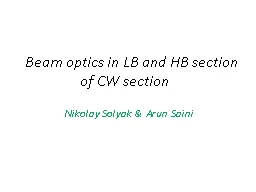PPT-In the previous section, we studied positive series, but we
Author : phoebe-click | Published Date : 2015-11-12
DEFINITION Absolute Convergence Verify that the series converges absolutely This series converges absolutely because the positive series with absolute values
Presentation Embed Code
Download Presentation
Download Presentation The PPT/PDF document "In the previous section, we studied posi..." is the property of its rightful owner. Permission is granted to download and print the materials on this website for personal, non-commercial use only, and to display it on your personal computer provided you do not modify the materials and that you retain all copyright notices contained in the materials. By downloading content from our website, you accept the terms of this agreement.
In the previous section, we studied positive series, but we: Transcript
Download Rules Of Document
"In the previous section, we studied positive series, but we"The content belongs to its owner. You may download and print it for personal use, without modification, and keep all copyright notices. By downloading, you agree to these terms.
Related Documents














